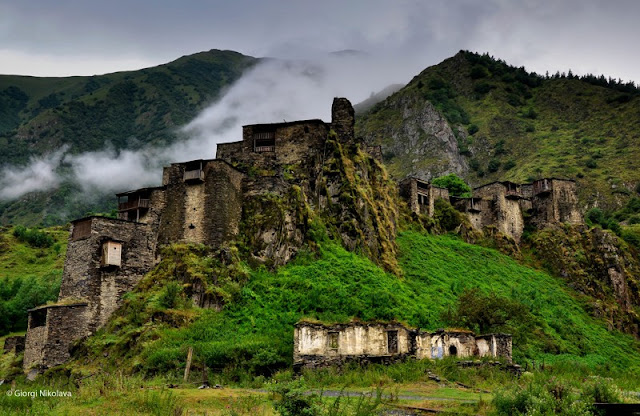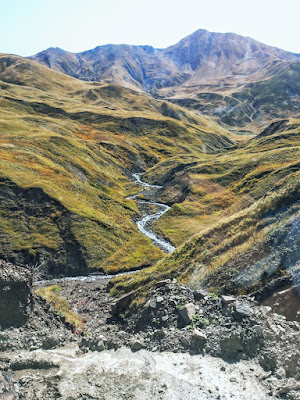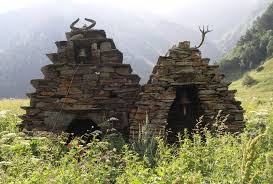"Gvrini"- Georgian scything song for the dead
Here I share with you an ancient Khevsuretian scything ritual called "Gvrinva".
In old Khevsureti - a magical mountain region in the northeast of Georgia - the dead were an integral part of the religious beliefs and the everyday life of the Khevsuretian people. Numerous special days over the calendar year were dedicated to revering the deceased. Besides the fixed dates the Khevsuretians would also turn to the ancestors to ask for guidance in points of a crisis of an individual or the broader community. The contact was customarily made through the mediumship of designated figures, one of them was the medium-person "Mesultane" (I will write an extra post about the "Mesultane"). The dead were as much involved in the lives of the villagers as the elders. The living would turn to them not only in times of major turmoils but also for help with mundane issues, like when the milk would get spoiled (which was actually not really a minor thing, considering that their main source of aliment was what their livestock provided). Khevsuretian people would commemorate the ancestors, give them offerings and ask for their blessing and protection.* One of those ways of how they tended to their dead was through an annual scything ritual called "Gvrinva".
What was "Gvrinva"?
"Gvrinva" was a ritual practice of singing "lament in voice" songs to the dead whiles scything the meadows. Every year the scything season was marked by "Tibis Shamshabati"- "Scything Tuesday". On that day the family of the latest deceased of the village would set a table with foods and drinks and invite the villagers. There they would reminisce the dead person, drink on them, cry over them and the "lamentor in voice" would sing lamenting songs for them. Only after this ritual did the scything season open for the whole village and no one would cut the grass before that mark. After the ritual at the house of the latest deceased ended, the men would go out to scythe the fields on the Khevsuretian hillslopes.
The scything was usually done by a group of men.* They would accompany the sound of the grass cutting with songs dedicated to the dead. Here the "lament in voice" songs would be sung, which were memorized in the death rituals, in that a "lamentor in voice" performed her singing. The iterated form of those songs as scything songs was called "Gvrini". "Gvrini" was the only exception to the rule of prohibition for repeating "lament in voice" songs. There was a strict taboo for repeating "lament in voice". It had to be sung only once, in the initial context of the death ritual, and never be repeated again, neither by the same person nor by any other. "Gvrini" was an exception to that rule, in which the laments would be sung by men in rhythms aligned to the scything movements and the sounds of cutting grass.
This ritual has been lost over the last decades. The Khevsuretian folklorist Amiran Arabuli told me in an interview, that even in his youth in the 1960s, this custom was already forgotten.
As I first heard about the ritual of "Gvrini" it touched my bones. I imagined myself standing there at the majestic and somewhat intimidating Khevsuretian mountain hills, crisp spring breezes stroking my cheeks, holding a scythe in the hand and moving it rhythmically, from right to left, right to left. Every sound of grass-cut bidding farewell to life. Accompanying the whooshes with heart-dear memorized songs dedicated to the dead.
* თინათინ ოჩიაური, მიმომხილველი, ტ. II, თბილისი 1951, გვ. 423-429./ Tinatin Ochiauri, Mimomkhilveli, Vol. II, Tbilisi 1951, pages 423-429. (Source in Georgian language)
*Khevsuretians had a quite strict gender division of job tasks. Scything was done by men-gendered people, as it was considered a high-risk job, due to the slope fields in the Caucasian mountains.
* If you'd like to know more about "Gvrini" and other Caucasian rites and customs visit: http://www.batsav.com/pages/oracular-speech-gvrini-kadagoba.html





Comments
Post a Comment